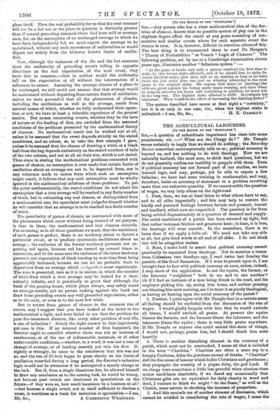(To TH8 EDITOR OP TRH "Spxotkrop..")
SIR, —Any person who has a clear mathematical idea of the doc- trine of chances, knows that no possible system of play can in the slightest degree affect the result at any game consisting of con- secutive and similar events where for each separate event the- chance is even. It is, however, difficult to convince others of this. The best thing is to recommend them to read De Morgan's "Theory of Probabilities "or Venn's "Logic of Chances." The following problem, set by me at a Cambridge examination eleven years ago, illustrates another "fallacious system" :— " At the game of heads and tails a person resolved the first time to- stake is. (the lowest stake allowed), and if he should lose, to stake 3s. (twice the first stake, plus one), and so on, staking as long as he loses- twice the last stake plus one, and on winning returning in the next game to the original stake. He argues that since (at starting) the odds are great against his losing many times running, and since when he wins he recovers his losses and something in addition, he must win in the long run. The highest stake allowed is £100. Investigate hi& argument. What would be the effect of increasing the limiting stake?"' The system described here seems at first isightn "certainty," but it is so only in one case, viz., when the highest stake is-


































 Previous page
Previous page